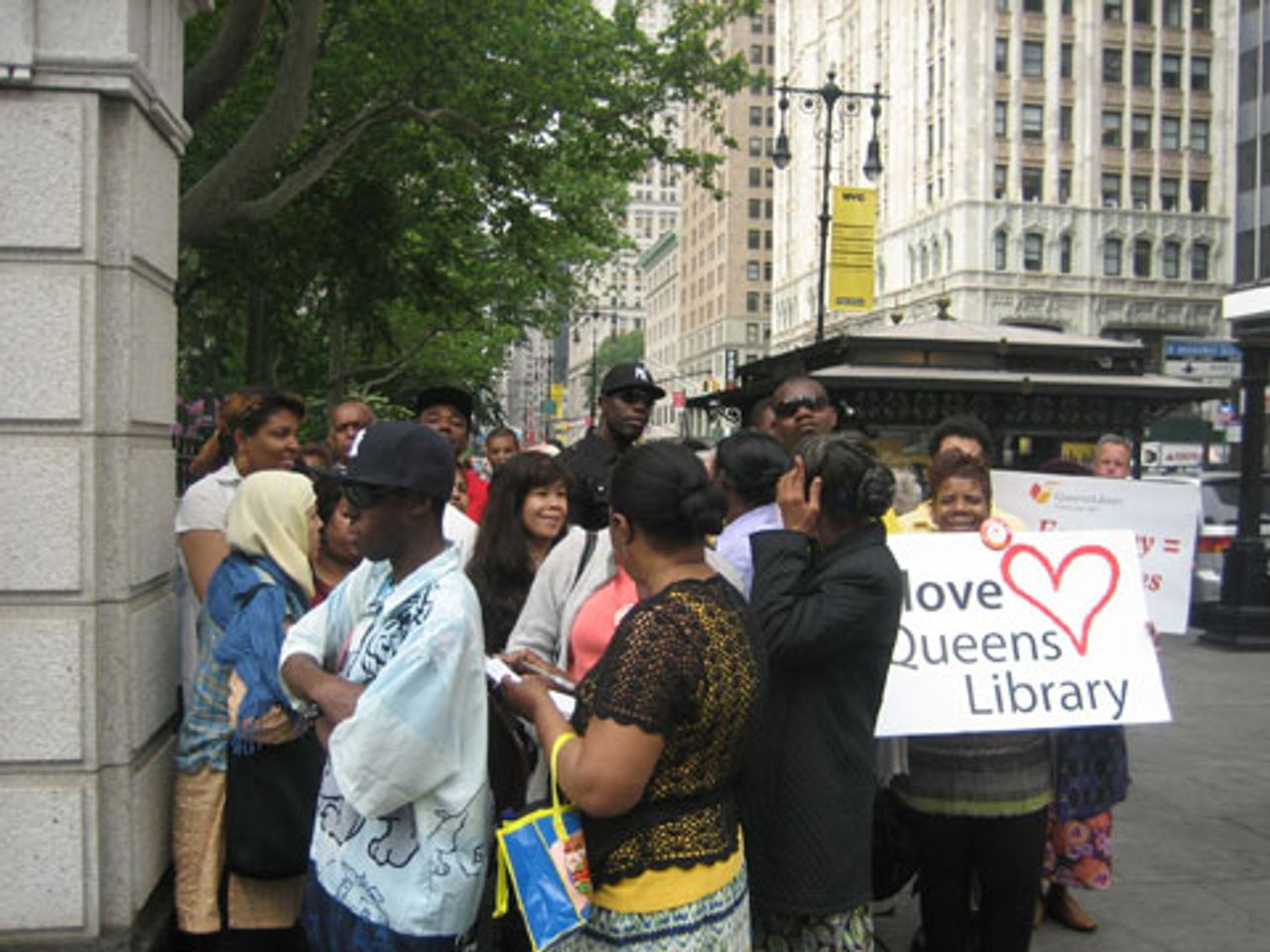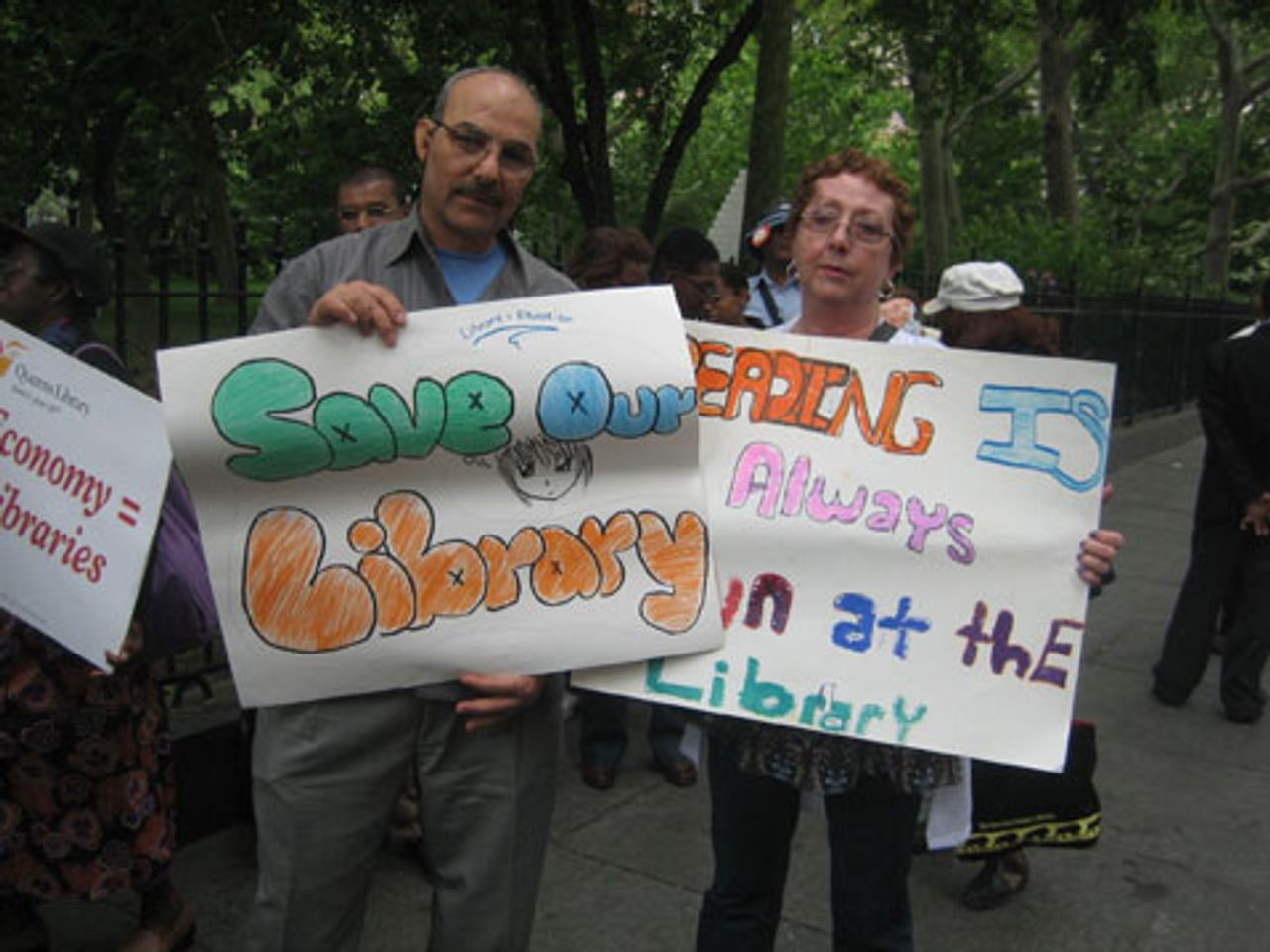New York City’s billionaire Mayor Michael Bloomberg has announced plans to cut nearly $100 million from the city’s libraries. This will have devastating consequences for a wide cross-section of the city’s population. At a time of growing poverty, unemployment and homelessness, public libraries are one of the few free services used by millions of working-class people in America’s largest city.
 Protest against cuts in the Public Library
Protest against cuts in the Public LibraryNew York City has three public library systems: one each for the boroughs of Brooklyn and Queens, and a third for New York, which serves the boroughs of Manhattan, Staten Island and the Bronx. The three systems have a combined total of over 200 branches. Each is a truly gargantuan system that provides services to millions of people.
The New York system circulated over 21 million items last year. It not only includes branch libraries used by some of the poorest sections of workers, but also world-class collections of music, photography, manuscripts, and the premier public research library in the country, on 42nd Street and Fifth Avenue in Manhattan, with over 44 million non-circulating items. In Manhattan, the Bronx and Staten Island, libraries held classes last year that over 820,000 people attended. 31,000 people used job-search programs at local libraries in the three boroughs.
The CEO of the New York Public Library, Paul LeClerc, told a New York City Council hearing that the cuts amount to the “the worst scenario ever,” with $40 million in budget cuts, on top of $17 million in cuts since 2008. Since that time the New York libraries’ 90 facilities were forced to lay off 423 workers or 18 percent of staff. The system will now be forced to eliminate 687 positions, mostly though layoffs, a full third of its staff.
The anticipated cuts will result, according to LeClerc, in six million fewer visits and two million fewer computer sessions. For many working class families, particularly in the Bronx, the poorest urban county in the United States (83 percent of families earn less than $50,000 a year), public libraries are the sole access they have to the Internet. The Bronx would have fully one million fewer yearly visits because of the cuts.
The Brooklyn Public Library (BPL) had 14 million visits in 2010, up two million from the previous year. 20 million items were circulated in 2010, an increase of 18 percent from 2009, the highest in its history. Its 1,100 Internet-linked computers are a lifeline for unemployed workers looking for a job. These achievements came in spite of an $11 million budget cut in 2009. “Literally millions come through our doors each year to improve their lives,” one leading library administrator noted.
The cuts proposed by the Mayor will axe over $25 million in funding from the BPL. Over 400 staff members will be laid off and another 160 vacant positions will not be filled. Sixteen branch libraries will be closed and service will be reduced overall by 40 percent. The library anticipates a drop by a third in circulation and attendance in its programs.
 Protest against cuts in the Public Library
Protest against cuts in the Public LibraryThe Queens Public Library, with 800,000 cardholders who make 14 million visits a year and borrow 23 million items, making it the largest library system in the US, is also facing cuts of $25 million. This is a system that had over 3 million computer sessions last year, over 200,000 visits by school classes, and sponsored 17,000 programs for children. It provides numerous resources for the large immigrant communities in Queens, including ESL classes and books and periodicals in dozens of languages.
In December, the Queens Library stopped buying new books in response to the crisis. It has already sent out pink slips to 230 employees and anticipates laying off 270 more. The library has lost 200 positions since 2008.
Under the new cuts, Sunday service would be eliminated altogether in Queens and only the central branch would be open on Saturdays. The library anticipates that there will be 1.5 million fewer computer sessions, and that 5,000 children will lose homework help and have no library access at all.
The massive cuts to the funding of libraries are a direct attack on the democratic rights of the working class. New York City’s libraries all date from the 19th century movement for free circulating libraries for the entire population, regardless of social status. Libraries were widely regarded as a cornerstone of democracy, guaranteeing what we would call today freedom of information. As early as 1803, Thomas Jefferson argued in favor of public lending libraries as an antidote to misinformation and as being necessary in a democratic republic.
Nearly 100 years ago, the Russian revolutionary leader Vladimir Lenin noted in amazement the masses of books that were circulated to ordinary people in New York’s library system, and the speed and ease with which they could obtain them, “The aim that is constantly pursued is to have a branch of the Public Library within three-quarters of a verst, i.e., within ten minutes’ walk of the house of every inhabitant, the branch library being the centre of all kinds of institutions and establishments for public education.”
Although he was an enemy of American capitalism, Lenin understood that access to libraries was a major achievement of the American working class, and that it was denied to workers in Tsarist Russia.
Libraries benefited from the philanthropy of such figures as John Jacob Astor and Andrew Carnegie. These men, despised as they were for their ruthless class war policies, nevertheless saw fit to advertise their democratic credentials.
Today the American ruling elite has lost the democratic sensibility and even these pretensions of this earlier period. The obscene wealth of a single hedge fund billionaire would meet the libraries’ immediate needs, but Bloomberg and his class insist that working people must pay for the crisis in every way possible.
About two hundred patrons and library workers protested the cuts to the Queens Library system on the steps of City Hall on Thursday. Many of these were adult learners in literacy programs and English as a Second Language programs. The World Socialist Web Site spoke to a number of them about the proposed library cuts.
Annemarie, an educator for the Head Start program for poor children, said that she uses the Rochdale branch frequently for Head Start. “I take out a lot books, and a lot of our parents do, too. I direct education for recent immigrants, and the library is a place that empowers them. A lot of our families are supported by the library. It has all kinds of educational programs, after school programs. They really depend on it.
“I just think that the money is not being branched out to where it should be. We’re the common person and the library is a source of education for us. Without the resources it provides, communities start breaking down. The library is one of the places where seniors and children can interact, where seniors can go at all. It is service for the whole community. These cuts are really a gold mine going down the drain.”
Marco, an education director from the Long Island City branch of the Queens Library, told us. “We have to save our libraries. It is the fabric of society. When all the other programs are cut, people come to the libraries to get services. They look for jobs there. There is adult basic education there, and these services are free.”
When asked if he felt that the protest would persuade the mayor to rescind the cuts, he said “No it won’t. Both of these parties represent the rich and they don’t care about us. We are too passive, though. We can’t take it any more. They run under the cover of supporting the people, but they are really very harmful to ordinary people. Look at what is happening to public sector workers. Their rights are disappearing.”
